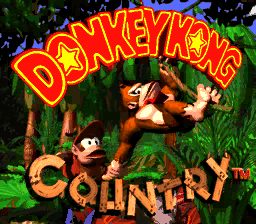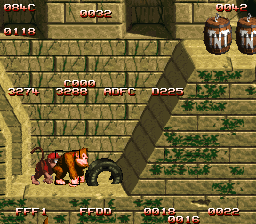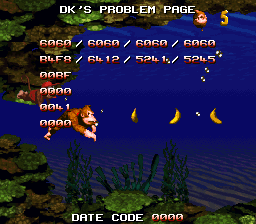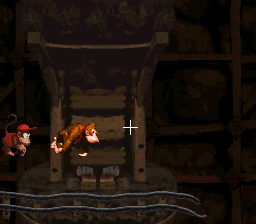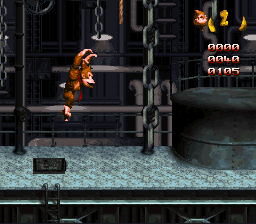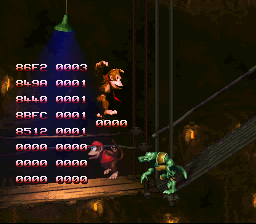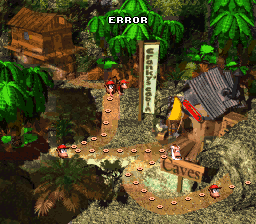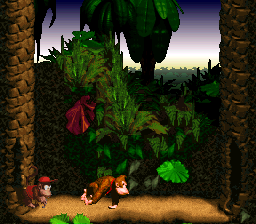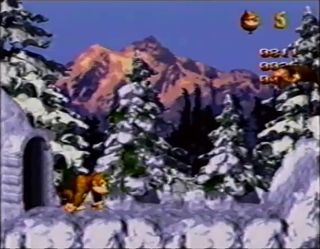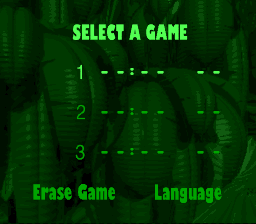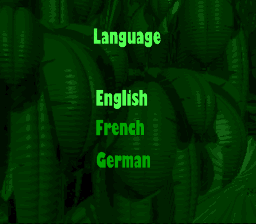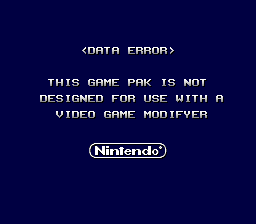Donkey Kong Country (SNES)
| Donkey Kong Country |
|---|
|
Also known as: Super Donkey Kong (JP)
|
Donkey Kong Country combines monkeys, bananas, and barrels into one package for the first time in human history.
Contents
- 1 Sub-Pages
- 2 Unused Music
- 3 Unused Sounds
- 4 Sound Effect Oddities
- 5 Sound Cycle
- 6 Debug Functions
- 7 Map Error Checking
- 8 Unused Room ID
- 9 Unused Animations and Frames
- 10 Unused Banana Groups
- 11 Unused Palettes
- 12 Unused Dialogue
- 13 Unused Fonts
- 14 Language Select
- 15 Region Check
- 16 Anti-Cheating?
- 17 Anti-Piracy
Sub-Pages
| Prerelease Info |
| Notes |
| Unused Bonus Room Layouts A gaggle of inaccessible bonus rooms. |
| Unused Object Graphics Graphics never seen in normal play. |
| Unused Object Subtypes While the objects are used, these variations are not. |
| Version Differences A large number of differences exist between regions and revisions. |
Unused Music
| Early | Final |
|---|---|
An early version of the boss music, found in US 1.0. It begins at a slower pace than the final boss music, but gradually increases in tempo until about halfway through the third loop, when it is close to the final version's pace. This song also has different instrument pointers, compared to any of the used songs, hence the sample pointers had to be changed in the SPC file for it to play correctly.
| Early | Final |
|---|---|
An early version of the map music with placeholders for some instruments. This version uses the cranking sound that some enemies make, such as Armies as they rev up, in place of the bass, while an out-of-key synth is used instead of the flute(?).
Unused Sounds
| To do: In addition to the ones listed below, twelve sound effects exist in the sound effect block which are completely unreferenced in the pointer table. Rip these. |
Several sound effects exist which are never heard in the game. Use the PAR code B8BCB7?? to replace the sound effect when collecting bananas with one of these, where ?? should be replaced with one of the following values:
44: A voice clip, consisting of short gulps that increase in consecutive pitch.
45: A duplicate of the last sound, but with higher notes.
69: A percussion sample that echoes once.
6A: A looped bubble sample that rises in pitch, then stops. This sound only plays properly in underwater levels.
6B: A high-pitched whine that oscillates in pitch.
6C: A arpeggio that fades in volume.
6D: What appears to be a note scale test: a cranking sample is looped in a sequence of rising notes, revealing aliasing as the sound gets higher before turning into a series of seemingly random pitches. These random pitches are the result of reading bytes outside of the note pitch table as pitch values.
71 (first channel), 72 (second channel): A little fanfare produced by layering two sound effects. The same method is used for the fanfare played when revealing hidden bonus area entrances.
Sound Effect Oddities
In Tanked Up Trouble, the sample that is supposed to be used for the sound effect that plays when the tank platform loses fuel is not loaded (sample ID 19). Thus, the sound effect changes depending on which levels were visited prior to Tanked Up Trouble. Here is how it should sound when the correct sample is loaded:
Similarly, in snow levels and Boss Dumb Drum, the Steel Keg clanging sound sample (ID 12) is not loaded, even though the sound effect that calls for it is. In the latter case, even though Steel Kegs do not appear in boss levels, their sound effect is used when Dumb Drum bounces off of the ground.
Sound Cycle
Highlight Erase Game on the file select menu and press Down, A, R, B, Y, Down, A, Y. Once the code is entered correctly, you will hear a fanfare for confirmation. Press Select, and the screen will briefly blank until it plays DK Island Swing. Press Select again to cycle through a set selection of music.
Debug Functions
There are a number of debug tools still left in the final ROM which can be accessed with cheat devices.
Camera & Collision Debug
Game Genie codes: 7CC8-0D6D 8FC8-0DAD 8AC8-0FDD
This displays debugging info for the camera and Donkey's (but not Diddy's) collision box.
- 084C: Camera's X-coordinate.
- 0118: Camera's Y-coordinate.
- 0042: Level ID - RAM $3E
- 0032: DK's current sprite ID - RAM $0D13 divided by 4
- C000, 3274, 3288, ADFC, D225: Unknown data.
- FFF1, FFDD: Relative X and Y coordinates of Donkey Kong's collision box.
- 0018, 0022: Width and height of Donkey Kong's collision box.
- 0016: Unknown data.
DK's Problem Page
Game Genie codes: 7EC8-0D6D, B8C8-0DAD, 86C8-0FDD
Activates a general debugging screen.
- First two rows: The last 16 bytes of save RAM.
- Third row: Level ID. - RAM $3E
- Fourth row: ID of last exit taken. - RAM $40
- Fifth row: Level status variable (see notes page for details) - RAM $1E15
- Sixth row: Level ID for Continue Barrel - RAM $2E
"DATE CODE" probably displayed a build date during development, but in the release version it's been nulled.
Free Movement Debug
Pro Action Replay Code: 7E053501 (display objects), 7E053502 (disable object display)
In this mode, all enemy objects lose their solidity and freeze. The player can use the D-Pad to move around freely. Some gravity is still present, but not much.
Level Completion Debug
Game Genie codes: 18C8-0D6D B2C8-0DAD 86C8-0FDD 6DB5-0AC7
This function should be displayed if RAM $1E3B is a non-zero value, but it's not called anywhere. It can be seen in the DKC Exposed promotional video.
- First row: Always 0000. In the promotional video it's 0811, which is probably a build date.
- Second row: Level ID. - RAM $3E
- Third row: First byte shows the number of completed rooms. This counts the bonus rooms and the level exit. The second byte is the total number of completable rooms in the level.
Palette Debug
Game Genie codes: D3C8-0D6D 67C8-0DAD 2D6F-AA1D 0260-AA4D (note that due to the way this debug function works, the game will be paused whenever it's accessed; the first three codes enable the debug, while the fourth code disables the pause)
This function should be displayed if RAM $1E3D is a non-zero value, but it's also not called anywhere. Since the debug function pauses the game, it was probably intended to be toggled with a button code.
The first two bytes of each line display the current palette addresses. The last two bytes display how many objects are currently using that palette.
The meaning of the last two bytes off to the side is unknown.
Map Error Checking
The overworld map will display "ERROR" when there is no text string associated with that room ID. This is also present in the Game Boy Color port.
Unused Room ID
Of the 255 room IDs in the game, only one is unused: Room 21. Using the code 7E003E21 on the map screen will transport you there.
This uses the same layout for the Jungle's small bonus room. There are no objects associated with it, so there is no way out. Even stranger, the music played in this room is the same music used for the boss areas.
It's possible that at some point in development, at least one of the bosses was to be fought here, as indicated by an image from Rare's old website, which shows the boss "Dumb Drum" in the room. (A video can be seen right here.)
Unused Animations and Frames
| To do: There's more here. Addresses for the sprites without pointers in the pointer table should also be added to this page, or the Notes page. |
Codes will be provided unless the animations/frames don't have pointers.
Donkey Kong
| 7E0D1360 to 7E0D1378, 7E0D1402 The head scratch part of this animation is still used for DK's death animation, but he gets back up to scratch his head instead of sitting down like this. | |
| 7E0D130C to 7E0D1338, 7E0D1406 An alternate winning animation for DK. | |
| (No pointer, but graphics are stored in ROM) DK turning while swimming. The final game has no animation, and you just automatically turn. | |
| (No pointer, but graphics are stored in ROM) DK pushing something. The only object that can be pushed is the tire, and there's no special animation for that. | |
| (No pointer, but graphics are stored in ROM) An unused animation similar to one of DK's attacks in Donkey Kong 64. Another possibility is that this was to be an animation for DK tagging in. |
Cranky Kong
| (No pointer, but graphics are stored in ROM) Cranky Kong is never seen walking in the SNES version, but the animation is used in the GBA version after the player defeats a boss. |
Barrels
| 7E0D13C8, 7E0D141B A Continue Barrel with the top busted open. Only one animation is used for the Continue Barrel in-game, and that's the Continue Barrel spinning. When you hit the Continue Barrel or spawn from it, the barrel is destroyed, so this animation never gets used. | |
| 7E0D13D8 to 7E0D13F4, 7E0D141B A barrel falling apart, intended for your partner showing up in a DK Barrel. The palette for this barrel is incorrect – the normal barrel palette is used here. This animation was made at a point when the base barrel graphics were different: note the steel hoop appearing on the inside of the barrel. |
Early Necky animation
| (No pointer, but graphics are stored in ROM) This animation uses an earlier design for the nut-throwing Necky. It has the coloring of Necky, but the proportions of Mini-Necky. This could mean that the two final designs branched off of this one. |
Queen B.
| Used | Full |
|---|---|
 |
 |
(No pointer, but graphics are stored in ROM)
Queen B.'s hit animation has a good number of unused frames that give the animation a much more fluid look.
Rambi
| Used | Full |
|---|---|
 |
 |
7E0D1330 to 7E0D134C, 7E0D1427
Rambi actually has more unused frames of his charge animation than used ones! In-game, only 2 frames of animation are used, while he actually has 8 frames dedicated to charging. Donkey Kong Country 2 bumps the charge animation up to 5 frames, using some (but not all) of the unused frames from here.
Slippa
| 7E0D1354 to 7E0D1364, 7E0D1425 A different version of Slippa's death animation. In-game, Slippa's animation for dying is similar to the one it does for jumping. |
Tire
Unused Banana Groups
The following banana groups are defined by the game, but are never used in any stage. To see them in-game, change ROM address 38C1C1 from 48 to the appropriate value.
Unused Palettes
Some objects have alternate palette data in the ROM that is unused in normal play. ROM addresses will be provided for each palette.
Croctopus
Palette address: 3C8B66 to 3C8B83
Croctopus palette with brown/yellow markings. The game uses palettes with blue and purple markings, but never this scheme.
Klaptrap
Green palette address: 3C8788 to 3C87A5
Chestnut palette address: 3C87C4 to 3C87E1
Grey palette address: 3C87E2 to 3C87FF
Klaptrap has 5 palettes in the ROM, only two of which are used—blue and purple. Like the Kritter and Zinger enemies, Klaptrap was meant to come in a variety of colors.
Kritter
Palette address: 3C8530 to 3C854D
Speaking of Kritter, he too has an unused palette, which gives him a blue-violet skin color.
Zinger
Grey/Purple palette address: 3C8DDC to 3C8DF9
Blue palette address: 3C8DFA to 3C8E17
Likewise, two additional flavors of Zinger were planned to appear in the game. Notably, palettes very similar to these are used in the Game Boy Advance remake—the only difference is that the wing colors were switched.
Unused Dialogue
Cranky has a large number of lines that never pop up when you visit him. The text data begins at ROM address 3C03C8.
Greetings
Cranky seems to have gone through a personality change during development, from "nice old man" to "angry old man". Some lines, especially in the ending, still seem a lot more kindly than Cranky would end up being in the sequels and external materials. More importantly, the lines below individually identify DK and Diddy, which doesn't happen in the final game; this is odd, because Funky's lines identifying individual characters do work.
Donkey Boy? Where's Diddy? Donkey, you young whippersnapper! Long time no see! Donkey Boy! It seems like years since we last met! It's about time you visited your frail, old Grandpa! Hey! Can you spare your old pappy a banana? And what have you brought for your old Grandpa? Well, you've amazed your old Grandpa by getting this far! So, you've finally come to get some game play advice from your old Grandpa! Diddy boy! Where's Donks? Diddy, you young pup! Boy, I can't believe how much you've grown!
Level Tips
For whatever reason, almost all of Cranky's level tips were removed from gameplay. The only ones that can be seen normally are from the first world, but lines exist for almost every level in the game! Some of these tips are present and used in later remakes, and Cranky gives tips in every world in the sequel.
Burn rubber for the golden rhino in Bouncy Bonanza. The bananas in Stop & Go Station will put you right! Avoid Mine Cart Carnage and jump early to get the extra life. Rolling some rubber will put you on the right road in Millstone Mayhem. On Snow Barrel Blast, sometimes down will not take you out; it may help you go forward. On Croctopus Chase, there's a right way and a wrong way to get past the barrels. In Ice Age Alley, birds of a feather flock together to get your wings. Bouncing the Bouncer will slide you to success during Slipside Ride! The TNT gives you a couple of real wall to wall blasts in Torchlight Trouble. For Elevator Antics, you'll have to climb higher than a hornet's nest! For you Trick Track Trekkers, the Gnawty twins gnow a secret! In Mine Cart Madness, you're just 3 bounces away from bonus land. Once you're in the Poison Pond, the right way is not the only way to get the point. Blackout Basement could give you a sinking feeling, but you'll end up sky high! Let Diddy hold out the TNT in Manic Mincers. Take enough rope and you'll amaze yourself in the Misty Mine. The Loopy Lights vulture's barrel will blow you away. The Platform Perils vulture knows it's sometimes better to come down to earth. You're in Tanked Up Trouble if you're all gassed up and nowhere to go! In Orang-utan Gang, follow the last barrel down to discover a barrel of laughs! A single banana is all you need for a bonus in Tree Top Town. Get on down with the bananas and get ready to party in Temple Tempest!
Other
Two more of Cranky's lines aren't referenced in the pointer table. The first is an enemy tip, while the second would be said when Cranky is finished talking.
Gnawty the beaver can be rolled or jumped on. I'm back to my cabin for a nap.
Early English Script
An early version of the game script can be found in the ROM, starting at address 2DE076. It's largely the same, and only three differences in game dialogue exist. Unfortunately, the top of the script has been overwritten, so any other differences cannot be determined.
| Early | Final |
|---|---|
| I can't play this game, the colors are all to rich for my poor old eyes! |
I can't play this game, the colors are all too rich for my poor old eyes! |
Merely a spelling fix for the final version.
| Early | Final |
|---|---|
| You can roll over Hister, or just squash him with a jump attack. |
You can roll over Slippa, or just squash him with a jump attack. |
Apparently Slippa was named Hister before the game was finalized. Godwin's Law?
| Early | Final |
|---|---|
| You dudes need some lives or something? Jungle Japes is the place for that! |
You dudes need some lives or something? Jungle Hijinxs is the place for that! |
The first level of the game was originally named Jungle Japes, rather than the retail version's Jungle Hijinxs. This alternate name would notably be used as the name of the first stage in Donkey Kong 64, as well as the Donkey Kong stage in Super Smash Bros. Melee.
Early German Script
An early unused German script can be found in the US ROM, which was changed/fixed a bit for the European version.
| US German Script | European German Script |
|---|---|
| Willkommen in Rhino Tal! | Willkommen im Rhino Tal! |
A simple grammar fix. "Im" is correct, while "in" was understandable but still incorrect.
| US German Script | European German Script |
|---|---|
| Damals wäre so ein Blödsinngar nicht erst programmiert worden! |
Damals wäre so ein Blödsinn gar nicht erst programmiert worden! |
The early script is missing an important space in the second line between "Blödsinn" and "gar". "Blödsinngar" is essentially meaningless, at least going by Google.
| US German Script | European German Script |
|---|---|
| Das einzige was mir dazu einfällt ist Durchfall und übelkeit! |
Das einzige was mir dazu einfällt ist Durchfall! |
This rancid message was changed from mentioning Diarrhea and nausea to just Diarrhea. Hooray?
| US German Script | European German Script |
|---|---|
| Ihr würdet ein gutes Spiel nicht erkennen, selbst wenn Ihr die Hauptdarsteller wäret! |
Ihr würdet ein gutes Spiel nicht erkennen, selbst wenn Ihr die Hauptdarsteller wärt! |
While "wäret" is an older and more poetic form of "wärt", this was likely changed because poetic speech isn't quite Cranky's forte.
| US German Script | European German Script |
|---|---|
| Im Dschungel-Fieber solltest Du die Baumspitzen nach Bonusleben absuchen! |
Im Dschungel-Fieber solltest Du die Palmspitzen nach Bonusleben absuchen! |
"Baumspitzen" (treetops) was changed to "Palmspitzen" (palmtree tops) for accuracy.
| US German Script | European German Script |
|---|---|
| In Glühbirnen Drama wird Dir das TNT einige Erleuchtungen bescheren! |
Im Glühbirnen Drama wird Dir das TNT einige Erleuchtungen bescheren! |
Another grammar fix, the second time this mistake (incorrect usage of "in", when "im" should be used) is made in this script.
| US German Script | European German Script |
|---|---|
| Bei den Fahrstuhl-Spielen sind die Seile die Schlüssel zum Erfolg! |
Bei den Fahrstuhl-Spielen sind der Seile die Schlüssel zum Erfolg! |
For some weird reason, this one was changed from the correct "die Seile" to "der Seile" (plural: die Seile, singular: das Seil). In the genitive case "der Seile" is correct, but here it isn't.
| US German Script | European German Script |
|---|---|
| Merkwürdig, aber mit Sprengstoff kann man im Oelfaß Boulevard die Boni zu finden! |
Merkwürdig, aber mit Sprengstoff kann man im Oelfaß Boulevard die Boni finden! |
The redundant "zu" was ousted. "Oelfaß" was used instead of the more correct "Ölfaß", possibly because they couldn't use capital umlauts.
| US German Script | European German Script |
|---|---|
| Der Koma Keller mag Dir einen untergehenden Eindruck vermit- teln, doch es bringt Dich hoch! |
Der Koma Keller mag Dir einen untergehenden Eindruck vermit- teln, doch es geht hoch! |
"Dich" (or "you") was introduced to add clarification.
| US German Script | European German Script |
|---|---|
| Achte auf Rambi das rhino! Er rammt die tür zu jedem versteckten Raum auf! |
Achte auf Rambi, das rhino! Er rammt die tür zu jedem versteckten Raum auf! |
A comma was added to the first line, but although "rhino" and "tür" should be uppercase neither got fixed. Moreover, it should be "Rambi, das Nashorn".
| US German Script | European German Script |
|---|---|
| Rambi, das Rhino hilft Dir, jedoch mußt Du es dafür belohnen! |
Rambi, das Rhino hilft Dir, jedoch mußt Du es gut behandeln! |
The US version is rather confusing: there's no way to reward Rambi for its efforts like it tells you to. In the European version you just need to treat it well, which makes more sense.
| US German Script | European German Script |
|---|---|
| Schnapp Dir die Extraleben-Balloons, bevor sie davonfliegen! |
Schnapp Dir die Extra-Leben-Balloons, bevor sie davonfliegen! |
"Extraleben" is hyphenated in the final script.
| US German Script | European German Script |
|---|---|
| Schon zurück? War mir klar, daß so ein Punk wie Du, den Job nicht zuende bringen würde... |
Schon zurück? War mir klar, daß so ein Punk wie Du, den Job nicht schaffen würde... |
The US version says "I knew a punk like you wouldn't finish the job", whereas the European version says "I knew a punk like you wouldn't succeed".
| US German Script | European German Script |
|---|---|
| Wie wäre es mit einem kleinen Dreher in meinen Speicher-Faß? |
Wie wäre es mit einem kleinen Dreher in meinem Speicher-Faß? |
Another grammar fix: "meinen" was changed to "meinem". It's still the same word, however.
| US German Script | European German Script |
|---|---|
| alles klar, Mann? Ist doch 'ne starke Sache, was? |
Alles klar, Mann? Ist doch 'ne starke Sache, was? |
The first sentence is properly capitalized in the European script.
Unused Fonts
Five fonts remain unused in the game. The first two of them are loaded with every level but are never actually seen; the latter three are never loaded but can be found in the ROM. The backgrounds of most of these fonts have been left opaque for better visibility.
Hexadecimal font. This was used for debugging in pre-release versions of the game. The font can be seen in the Donkey Kong Country promotional video below, starting at the 8:41 mark.
Alphanumeric font with a few symbols mixed in. Used for further debugging.
Expanded alphanumeric font featuring a greater number of symbols, including a lower case S. This font has no shading at all, the characters are solid white.
A shaded version of the expanded alphanumeric font. Also includes the right angle bracket missing from the previous font.
Yet another unused alphanumeric font, different from the previous ones and this time including lowercase. It's worth noting that this font has some similarities to those used in Rare's older NES games, such as the lowercase-styled uppercase Y.
Donkey Kong Country Promotional Video
Language Select
The European versions include a language selection menu on the file select screen, offering English, French, and German. This menu is accessible in the US version (at least 1.0) by setting RAM address 0581 to 04 on the file select screen and pressing A. The German translation appears to be complete, but French only displays garbage graphics.
The selected language is actually stored as an ASCII string at the very beginning of the save file. The game compares the first 8 bytes against a list of languages. This list also includes Japanese (in both US and European versions), but the game only checks the first three entries in the list. Forcing it to use Japanese (by setting RAM address 0567 to 06) only crashes the game.
Region Check
| Japan | World |
|---|---|
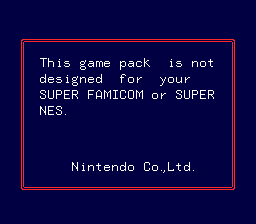 |
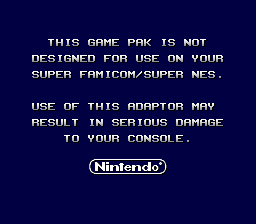 |
This message appears after the Rare logo if trying to play a NTSC cart on a PAL system or vice versa. It's worth noting the game attempts to hide this check by using the operations LDX #$0118 then LDA $2027,x instead of just a simple LDA $213F to access the register containing the video mode. The latter would be trivial to locate and subsequently disable in a hex editor.
Anti-Cheating?
| To do: Search the Japanese version to see if there's any text/tilemap for this buried in the data. The text printing programming doesn't exist. |
The US and European carts contain the above message along with the programming required to print it on-screen, but there's no sign of the corresponding programming that checks for the presence of a game enhancer.
Anti-Piracy
| Japan | World |
|---|---|
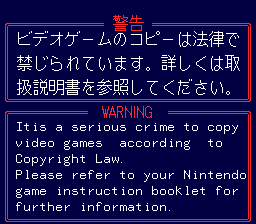 |
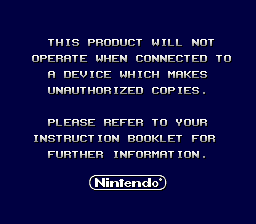 |
There are two anti-piracy tests when beginning a game:
- If 0KB SRAM is detected, the warning is displayed.
- If more than 2KB SRAM is detected (i.e., more than the game normally has), the warning is displayed. Backup units (aka cartridge copiers) in the 1990s would often have a greater amount of SRAM in order to support a wide variety of games.
- Featured articles
- Featured main articles
- Pages missing developer references
- Games developed by Rare
- Pages missing publisher references
- Games published by Nintendo
- Games published by Hyundai
- SNES games
- Super Famicom Box games
- Pages missing date references
- Games released in 1994
- Games released in November
- Games released on November 26
- Games released on November 21
- Games released on November 18
- Games with unused areas
- Games with unused enemies
- Games with unused graphics
- Games with unused items
- Games with unused music
- Games with unused sounds
- Games with unused text
- Games with debugging functions
- Games with hidden sound tests
- Games with regional differences
- Games with revisional differences
- Games with anti-piracy methods
- Pages with a Data Crystal link
- To do
- Donkey Kong series
Cleanup > Pages missing date references
Cleanup > Pages missing developer references
Cleanup > Pages missing publisher references
Cleanup > To do
Games > Games by content > Games with anti-piracy methods
Games > Games by content > Games with debugging functions
Games > Games by content > Games with hidden sound tests
Games > Games by content > Games with regional differences
Games > Games by content > Games with revisional differences
Games > Games by content > Games with unused areas
Games > Games by content > Games with unused enemies
Games > Games by content > Games with unused graphics
Games > Games by content > Games with unused items
Games > Games by content > Games with unused music
Games > Games by content > Games with unused sounds
Games > Games by content > Games with unused text
Games > Games by content > Pages with a Data Crystal link
Games > Games by developer > Games developed by Microsoft > Games developed by Xbox Game Studios > Games developed by Rare
Games > Games by platform > SNES games
Games > Games by platform > SNES games > Super Famicom Box games
Games > Games by publisher > Games published by Hyundai
Games > Games by publisher > Games published by Nintendo
Games > Games by release date > Games released in 1994
Games > Games by release date > Games released in November
Games > Games by release date > Games released in November > Games released on November 18
Games > Games by release date > Games released in November > Games released on November 21
Games > Games by release date > Games released in November > Games released on November 26
Games > Games by series > Donkey Kong series
The Cutting Room Floor > Featured articles
The Cutting Room Floor > Featured articles > Featured main articles
